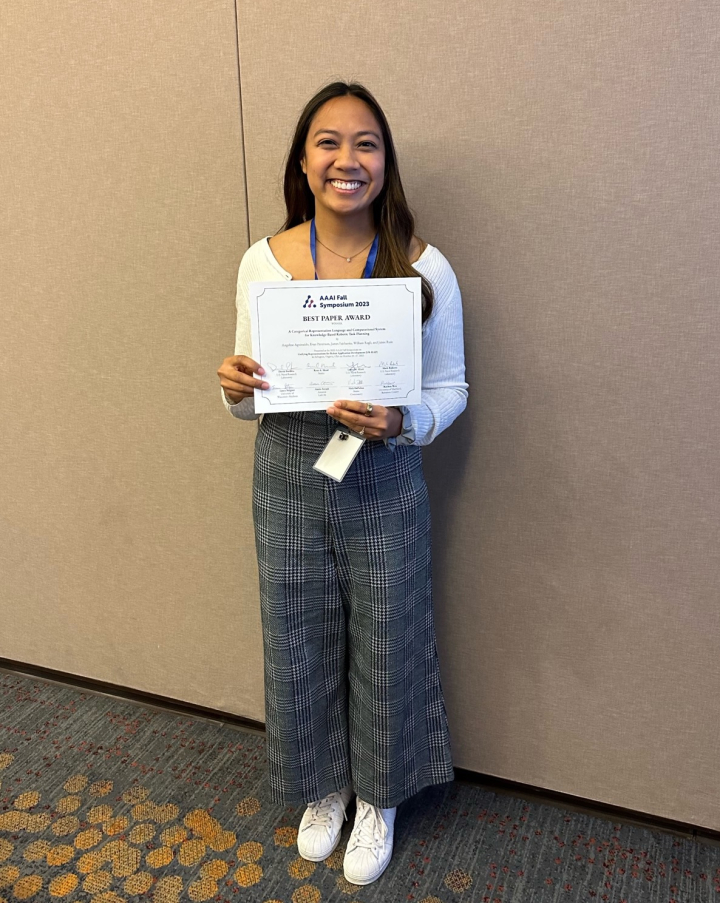Ph.D. Student Angeline Aguinaldo Wins Best Paper Award at AAAI Fall Symposium
Angeline Aguinaldo, a computer science Ph.D. student at the University of Maryland, received a Best Paper Award for her research in the field of robotic representation at the 2023 Association for the Advancement of Artificial Intelligence (AAAI) Fall Symposium on Unifying Representations for Robot Application Development, held in Arlington, Virginia, from October 25 to 27, 2023. Her paper, titled “A Categorical Representation Language and Computational System for Knowledge-Based Robotic Task Planning,” made a notable contribution to AI planning.
In addition to Aguinaldo, collaborators on the research included UMD Computer Science Professor and Director of the Institute for Systems Research William Regli, Topos Institute Research Scientist Evan Patterson, and University of Florida Assistant Professor James Fairbanks and Associate Professor Jaime Ruiz.
Aguinaldo's work has clear advantages compared with traditional planning methods, particularly in dealing with hidden conditions and outcomes. It offers a more organized framework for solving problems in robotics, ultimately leading to more efficient and dependable planning systems.
Aguinaldo's paper offers a fresh perspective on traditional planning languages used in robotics. It tackles the challenges these languages face in dealing with hidden changes in the world using concise action descriptions. Her approach draws upon category theory concepts, a powerful tool for expressing and analyzing mathematical ideas across different areas of study.
Her research formalizes the meaning of statements based on a user-defined framework, ensuring that the meaning remains consistent when the robot transitions between different situations. This method provides a structured way to understand complex scenarios and update plans.
Aguinaldo views the recognition as a significant step in her journey within the field of robotics.
“Winning the award was exciting, and it felt like a strong validation of my work and the unconventional path I chose to explore category theory as a solution to robotic representation problems,” Aguinaldo said. “The recognition fueled my confidence in the potential of this mathematical framework to manage and update complex scenes in AI planning. It was gratifying to see the community acknowledge and support my interest in a direction that, I believe, could shape the future of robotic task planning.”
Her research has the potential to impact society by improving the deployment of robots in practical applications.
“The implications of this work are substantial for the future of robotics,” Aguinaldo said. “It could greatly enhance the practical deployment of robots in real-world tasks, where managing complexity and implicit ontological conditions are crucial.”
Aguinaldo's research may inspire future generations of roboticists and advance the field into new dimensions of possibility.
"About four years ago, I introduced Angeline to concepts from the field of category theory, thinking there might be potential for exploring its use as a mathematical technique to enhance interoperability," said Regli, Aguinaldo's advisor. "We had a project funded by the Advanced Robotics and Manufacturing Institute that aimed to examine interoperability in the context of robotics. With this background, Angeline began working on this and has been demonstrating how these ideas could be applied to practical problems."
Founded in 1979, AAAI is a prominent scientific society focused on advancing the understanding of the mechanisms underlying thought and intelligent behavior and their application in machines.
Story by Samuel Malede Zewdu, CS Communications
The Department welcomes comments, suggestions and corrections. Send email to editor [-at-] cs [dot] umd [dot] edu.
